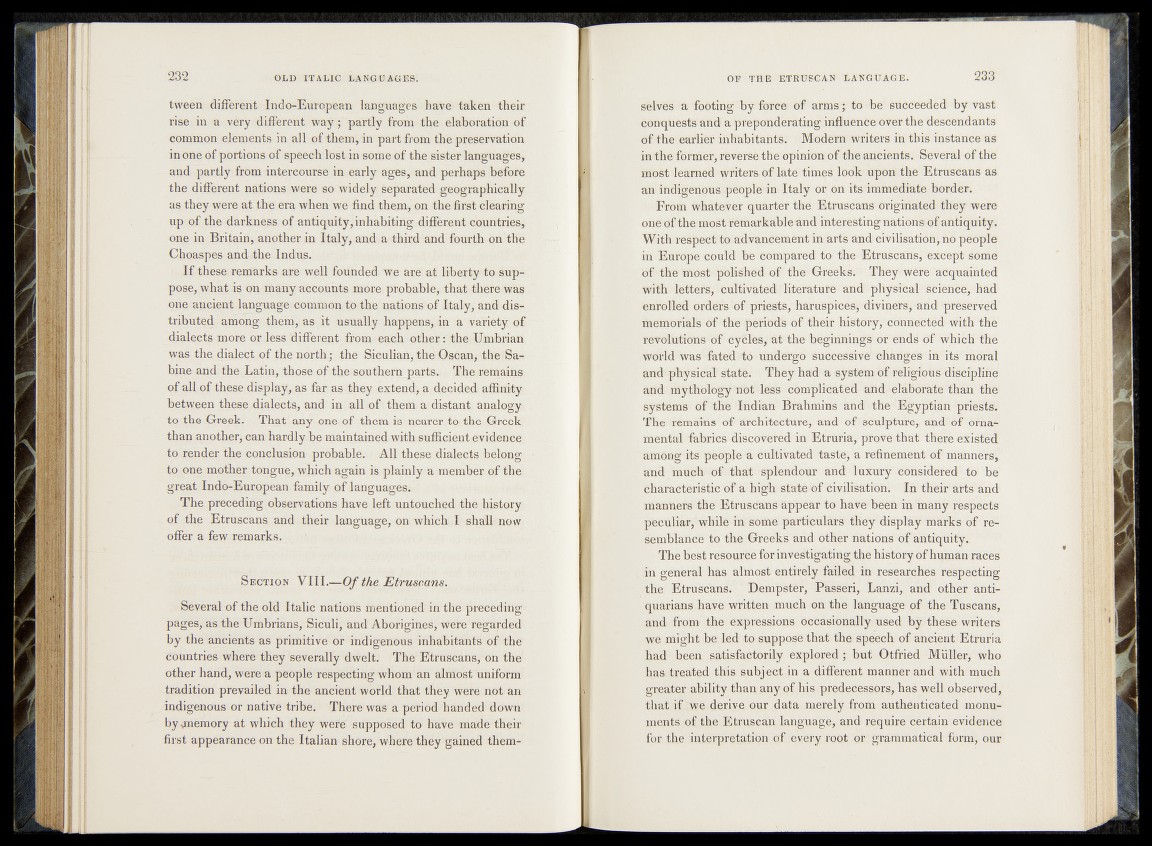
tween different Indo-European languages have taken their
rise in a very different way ; partly from the elaboration of
common elements in all of them, in part from the preservation
in one of portions of speech lost in some of the sister languages,
and partly from intercourse in early ages, and perhaps before
the different nations were so widely separated geographically
as they were at the era when we find them, on the first clearing
up of the darkness, of antiquity,inhabiting different countries,
one in Britain, another in Italy, and a third and fourth on the
Choaspes and the Indus.
I f these remarks are well founded we are at liberty- to sup*
pose, what is on many accounts more probable, that there was
one ancient language common to the nationspf Italy, and distributed
among them, as it usually happens, in a variety of
dialects more or less different from each other : the>Umbrian
was the dialect of the north; the Siculian, the Oscan, the^Sa*
bine and the Latin, those of the southern parts.;. The remains
of all of these display, as far as they extend; a decided’affinity
between these dialects, and in all of them a distant analogy
to the Greek. That any one of them is nearer to the Greek
than another, can hardly be maintained with.sufficient evidence*
to render the conclusion probable. All these dialects belongs
to one mother tongue, which again is plainly a member of the
great Indo-European family of languages;
The preceding observations have left untouched the history
of the Etruscans and their language, on which. I shall now
offer a few remarks.
Section V III .—O f the. Etruscans.
Several of the old Italic nations mentioned in the preceding
pages, as the Umbrians, Siculi, and Aborigines, were regarded
by the ancients as primitive or indigenous inhabitants of the
countries where they severally dwelt. The Etruscans, on the
other hand, were a people respecting whom an almost uniform
tradition prevailed in the ancient world that they were not an
indigenous or native tribe. There was a period handed down
by anemory at which they were supposed to have made their
first appearance on the Italian shore, where they gained themarms;
to be succeeded by vast
conquests and a preponderating influence over the descendants
of the earlier inhabitants. Modern writers in this instance as
in the former, reverse the opinion of the ancients. Several of the
most learned writers of latex times look upon the Etruscans as
an indigenous , people1 in Italy or on its immediate border.
v.iErom whatever quarter the Etruscans originated they were
one of the most-remarkable and interesting nation^of antiquity.
With respect to advancement in arts and civilisation; no people
in Edldpé could be compared to "the Etruscan’s, 'éxcfept? lomé
'óf' the most polished o f the1' Greeks*.^ They wèîe acquainted
with létters, ' cultivated * literature and-* physical' seielicè’, had
enrolled orders of priests," haruspicës^ diviners,-and preserved
memorials 'Of*1 the periods of their biStbry, 'conneCtëfl: with the
revolutions Of cycles; at the beginnings brands1 -of -which the
to undergo successive' change’s^in its moral
and' physical State. They had a system ó f rfffi^fcuSHl^ciplinè
and mythology nbt‘ tèss complicated and elaborate than thé
, S f S i i m & I n d i a n BrahillhS M i th e ;Egy^Mh
The remains*Of architecture," and "ofsculpture, a n d ’of ornamental
fabrics discovered in Etruria, prove th a t thérë existed
among its people a cultivated taste, a refinement o f manners1**'
and much of that splendour and luxury -'considered to be'
characteristic of a high state o f civilisation! In their arts' and
manners the Etruscans appear to have been in m ah ^ ^ ^ fe e ts
peculiar, while in some particulars th^pdisplay marks of resemblance
to the Greeks and other nations of antiqûitÿ.
The best resource for investigating the history of human races
in general has almost entirely failed In researches, respecting
the Etruschns. Dempster, -Passeri, Lanzi, and other antiquarians
have written much on the language of the Tùscàûs,
and from the expressions occasionally-used by thesewriters
we might be led to suppose that thé speech of ancient Etruria
had been satisfactorily explored’; but Otffied^Muller, who
has treated this subje<at.,in a different manner and with much
greater ability than any Qf^his, predecessors, haé well pbserved,
that if 7%e,derive our data merely from authenticated monu-
mentS:pf the Etruscan language, and require certain evidence
for the interpretation of every root ©r " grammatical form, our